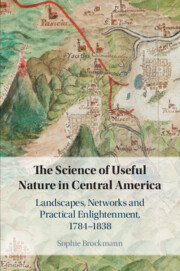 The Science of Useful Nature in Central America
The Science of Useful Nature in Central America Book contents
- The Science of Useful Nature in Central America
- The Science of Useful Nature in Central America
- Copyright page
- Dedication
- Contents
- Figures
- Acknowledgements
- Notes on Translations and Names
- Abbreviations and Acronyms
- Additional material
- Introduction: A Kingdom of Vast Extension
- 1 Landscape, Ruins, and Governance
- 2 Networks of Knowledge and Action
- 3 Making Enlightenment Local
- 4 Useful Geography in Practice
- 5 Transforming Environments
- 6 Independence and Useful Nature
- Conclusions
- Glossary of Colonial Administrative Terms
- Bibliography
- Index
2 - Networks of Knowledge and Action
Published online by Cambridge University Press: 27 August 2020
- The Science of Useful Nature in Central America
- The Science of Useful Nature in Central America
- Copyright page
- Dedication
- Contents
- Figures
- Acknowledgements
- Notes on Translations and Names
- Abbreviations and Acronyms
- Additional material
- Introduction: A Kingdom of Vast Extension
- 1 Landscape, Ruins, and Governance
- 2 Networks of Knowledge and Action
- 3 Making Enlightenment Local
- 4 Useful Geography in Practice
- 5 Transforming Environments
- 6 Independence and Useful Nature
- Conclusions
- Glossary of Colonial Administrative Terms
- Bibliography
- Index
Summary
Chapter 2 contrasts these relatively rigid pathways of bureaucratic information-gathering with the novel pathways of communication that the newly founded Economic Society provided. It demonstrates how the Society built up a network of information exchange through correspondence, as well as the publication of a newspaper, the Gazeta de Guatemala. These networks were designed to extend the reach of the Society from urban contexts into rural ones and had an active purpose: members and their associates were exhorted to grow, collect, and harvest economically useful plants. Reports from members over two decades show that, on a small scale at least, this succeeded, leading to an exchange of useful plant material. The varied social position and geographical locations of the newspaper’s subscribers also made its pages an exceptional forum for debate, creating a nascent ‘public sphere’. The networks even extended beyond the Audiencia’s borders, placing Central America in a context of global economic botany and scholarship. One manifestation of the extension of the Society’s practical network was that a member imported a collection of ‘exotic’ plants and seeds from Sumatra and Jamaica, plants which were then grown and harvested in Central America with some success.
Keywords
- Type
- Chapter
- Information
- The Science of Useful Nature in Central AmericaLandscapes, Networks and Practical Enlightenment, 1784–1838, pp. 58 - 90Publisher: Cambridge University PressPrint publication year: 2020


